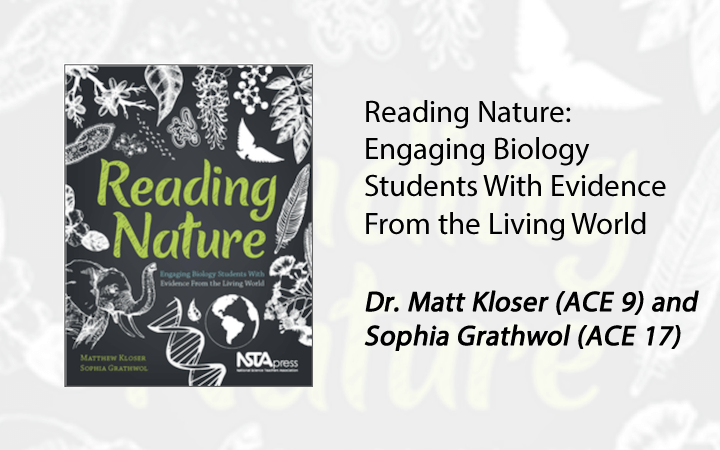Gone are the days of young children sitting stoically at their desks memorizing scientific facts handed down from generation to generation. Science class need not be only educational, but also creative, social, and fun. That's what Dr. Matt Kloser, the founding director of the Notre Dame Center for STEM Education, and science educator Sophie Troy Grathwol posit in their new book, Reading Nature: Engaging Biology Students With Evidence From the Living World.
 Kloser (ACE 9, Birmingham), a fellow at the Institute for Educational Initiatives, and Grathwol (ACE 17, Phoenix, ENL 7, and ChACE 12), who has a passion for science and English as a New Language, have designed their book to motivate students in grades 6–12 to ask not both "Why?" and "How do we know?" and major concepts in biology. Using original scientific articles, they adapted the source material extensively, highlighting the role of people in the narrative and providing both context and relevant data for all investigations. To facilitate teaching, the book also provides helpful teacher questions and prompts.
Kloser (ACE 9, Birmingham), a fellow at the Institute for Educational Initiatives, and Grathwol (ACE 17, Phoenix, ENL 7, and ChACE 12), who has a passion for science and English as a New Language, have designed their book to motivate students in grades 6–12 to ask not both "Why?" and "How do we know?" and major concepts in biology. Using original scientific articles, they adapted the source material extensively, highlighting the role of people in the narrative and providing both context and relevant data for all investigations. To facilitate teaching, the book also provides helpful teacher questions and prompts.
Each of the evidence-based texts featured in the book ties into one of five disciplinary core ideas—from molecules to organisms, ecosystems, heredity, biological evolution, and human impacts on Earth systems. Teachers can use Reading Nature as an inquiry activity at the beginning of a unit or as an introduction to an investigation. They can also use it to pull ideas together before a summative assessment.
It's also the National Science Teachers Association's (NSTA) September "Book Beat" featured publication. The NSTA is the largest professional organization in the world promoting excellence in science teaching and learning, preschool through college. NSTA's membership includes approximately 50,000 science teachers, science supervisors, administrators, scientists, business representatives, and others involved in science education.
 Alliance for Catholic Education
Alliance for Catholic Education
